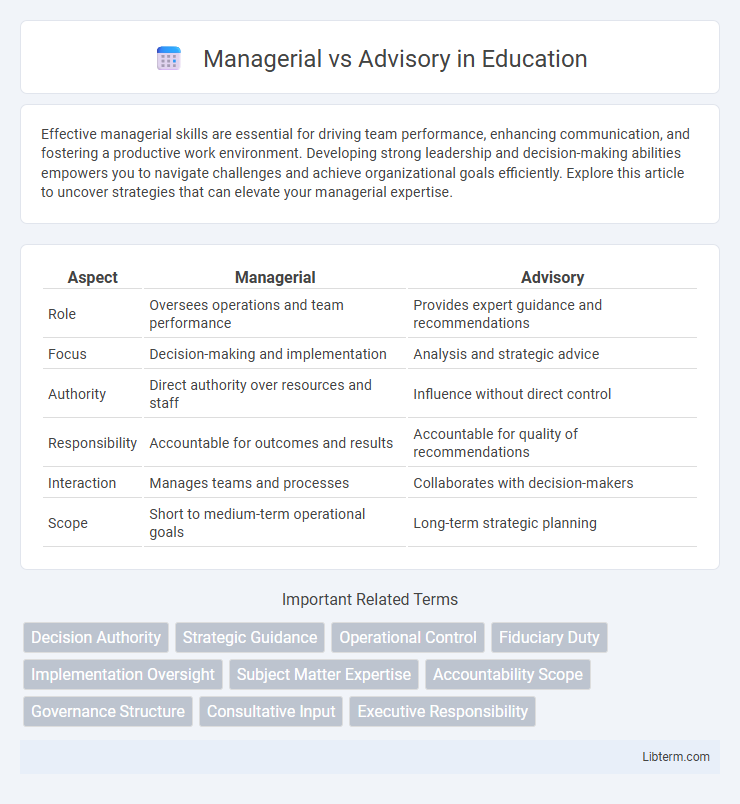Effective managerial skills are essential for driving team performance, enhancing communication, and fostering a productive work environment. Developing strong leadership and decision-making abilities empowers you to navigate challenges and achieve organizational goals efficiently. Explore this article to uncover strategies that can elevate your managerial expertise.
Table of Comparison
| Aspect | Managerial | Advisory |
|---|---|---|
| Role | Oversees operations and team performance | Provides expert guidance and recommendations |
| Focus | Decision-making and implementation | Analysis and strategic advice |
| Authority | Direct authority over resources and staff | Influence without direct control |
| Responsibility | Accountable for outcomes and results | Accountable for quality of recommendations |
| Interaction | Manages teams and processes | Collaborates with decision-makers |
| Scope | Short to medium-term operational goals | Long-term strategic planning |
Introduction to Managerial and Advisory Roles
Managerial roles involve directing teams, making strategic decisions, and overseeing daily operations to achieve organizational goals. Advisory roles focus on providing expert guidance, insights, and recommendations without direct authority over implementation. Both roles require strong communication and analytical skills, but managerial positions emphasize leadership and execution, while advisory positions prioritize influence and expertise.
Defining Managerial Responsibilities
Managerial responsibilities encompass overseeing daily operations, implementing strategic plans, and directly managing teams to achieve organizational goals. In contrast, advisory roles focus on providing expert guidance and recommendations without direct decision-making authority or enforcement capabilities. Clear distinction in defining managerial duties ensures accountability and effective execution of company objectives.
Understanding the Advisory Function
The advisory function centers on providing expert guidance and strategic insights to support decision-making without direct authority over implementation. It involves analyzing complex data, identifying opportunities, and recommending best practices to achieve organizational goals. Managers utilize advisory input to enhance leadership effectiveness and operational outcomes by integrating expert advice into actionable plans.
Key Differences Between Managers and Advisors
Managers hold decision-making authority and oversee the execution of organizational strategies, managing teams and resources to meet specific goals. Advisors provide expert guidance and recommendations based on specialized knowledge without direct control over implementation or operations. The key difference lies in authority and responsibility: managers drive action and accountability, while advisors influence strategy through counsel and expertise.
Core Skills Required for Managers vs Advisors
Managers require strong leadership, decision-making, and project management skills to effectively direct teams and achieve organizational goals. Advisors need exceptional analytical, communication, and problem-solving abilities to provide strategic guidance and informed recommendations. Both roles demand emotional intelligence and industry expertise, but managers emphasize operational execution while advisors focus on strategic insight.
Decision-Making Authority: Managerial vs Advisory
Managerial roles involve direct decision-making authority, overseeing operations, and implementing strategies within an organization. Advisory positions provide expert recommendations and insights without the power to enforce decisions, supporting managers and executives in their choices. Understanding the distinction between managerial authority and advisory input is essential for effective organizational governance and accountability.
Impacts on Organizational Structure
Managerial roles directly influence organizational structure by defining hierarchical levels, assigning responsibilities, and streamlining decision-making processes to ensure operational efficiency. Advisory roles impact organizational structure indirectly by shaping strategic direction, promoting innovation, and encouraging adaptive frameworks without altering formal authority lines. Effective organizations balance managerial authority with advisory input to foster both control and flexibility, enhancing overall performance and adaptability.
Advantages and Limitations of Each Role
Managerial roles provide direct authority over team operations, enabling decision-making and resource allocation to drive project completion efficiently, but may face limitations in flexibility and require balancing multiple responsibilities. Advisory roles offer expert guidance and strategic insights without direct control, promoting unbiased recommendations and fostering innovation, though their impact depends heavily on the receptiveness of management and may lack enforcement power. Understanding these distinctions helps organizations leverage managerial decisiveness alongside advisory expertise for optimal performance.
When to Choose Management or Advisory Services
Choose managerial services when your business requires hands-on leadership, direct decision-making, and daily operations management to drive specific outcomes. Opt for advisory services if expert guidance, strategic insights, and specialized recommendations are needed without altering existing management structures. Businesses facing complex challenges but retaining capable leadership benefit most from advisory support, while companies needing active control and execution prefer management services.
Conclusion: Selecting the Right Approach
Choosing between managerial and advisory roles depends on organizational needs and leadership style. Managerial positions demand direct control over operations and decision-making, while advisory roles emphasize strategic guidance without executive authority. Evaluating company goals and culture helps determine the optimal approach for effective leadership and growth.
Managerial Infographic

 libterm.com
libterm.com